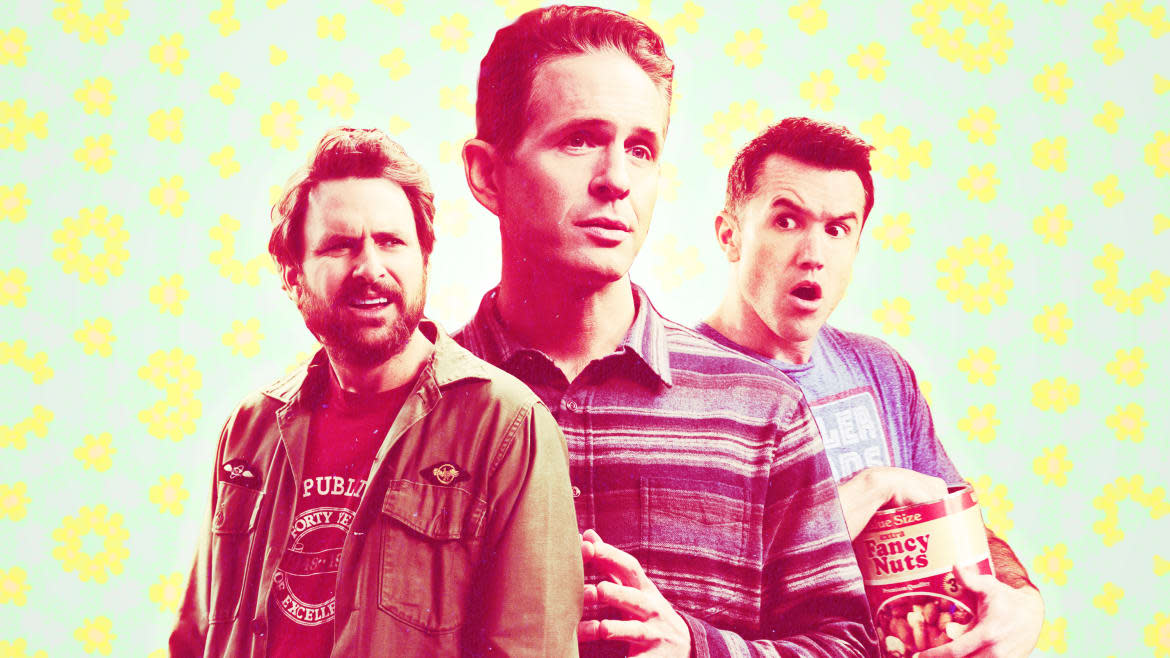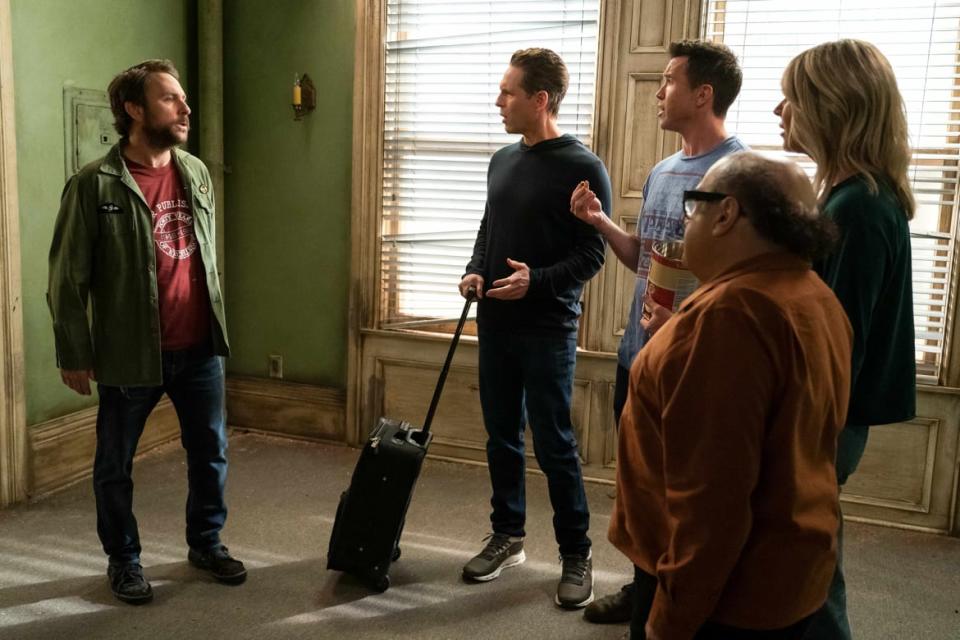Why ‘It’s Always Sunny’ Fans Love the Worst People on TV

A few months ago, I was listening to The Always Sunny Podcast (as I do quite regularly), the program hosted by the three co-creators, writers, and stars of It’s Always Sunny in Philadelphia. Each episode finds Glenn Howerton, Charlie Day, and Rob McElhenney going through their sitcom episode-to-episode from the beginning (though occasionally veering off course), and using discussion as a jumping-off point for anything from behind-the-scenes tidbits to road rage incidents. During the first of two call-in episodes the hosts have done, I was pleased to hear an excited young woman tell the guys that she wished Rob and his wife, fellow Sunny co-star Kaitlin Olson, were “her parents”—a celebrity designation I was all too familiar with.
The men were evidently charmed to hear it as well, though somewhat facetiously disappointed to now be at an age where they’re referred to by young fans as “fathers,” or even “uncles,” as the previous female caller had designated them. But it was also clear that the guys didn’t actually comprehend the true implication of their fans referring to them as “parents'' and “dads.”
I laughed to myself as I listened, wondering whether Day, Howerton, and McElhenney had any real conception of the nature of the fandom that they have spawned, in the whopping 18 years since their show premiered. It’s the same dedicated fandom that has allowed for the somehow still-niche series to take up the mantle of “longest-running live action American sitcom.” Listening to that podcast episode, I fondly recalled the time I spent on Tumblr in college—as a person perpetually on the periphery of obsessive fandom but never quite community-minded enough to engage on a level larger than myself—scrolling casually past erotic art of “MacDennis” (McElhenney and Howerton’s characters, respectively) and headcanons of Charlie Kelly (Day) as asexual.
In the years since I left Tumblr and graduated college, and as the show now welcomes its 16th season on June 5, it seems that the Always Sunny fan community on that site (referred to as “Sunnyblr,” I’ve learned) never moved on. In fact, that fandom has only spread further and become arguably more fanatical than the level I was familiar with. Sunny fans now occupy their own space on Twitter, called “SunnyTwt,” in addition to the litany of fancams made up of clips from the show, meticulously edited and uploaded onto TikTok. Many—most?—series, be it television or film, end up with an accompanying fandom to produce fan art, conjure romantic “ships” between characters, and basically act as safe spaces for people to be, well, wildly fixated on the show.
But the Sunny community is a uniquely zealous and fascinating one, especially for a sitcom that the average person might associate with college-aged boys that don a “Paddy’s Pub” tee while out on a bar crawl in Philly. Indeed, searching other sitcom tags on Tumblr did not immediately turn up the kind of passionate, romanticized fan content you find when you search “Always Sunny.”
Charlie Day Owes Everything to Guillermo del Toro—and Mountain Dew
Whether they realize it or not, the environment that Howerton/Day/McElhenney have sown with the content of their series, the characters they shaped, and the relationship to their fans—exacerbated and made more intimate with their podcast and live shows—has reaped a perfect breeding ground for obsessive standom in a new generation of fans. Just as Succession unexpectedly cultivated a legion of fancam-making, babygirlifying stans, so too do It’s Always Sunny in Philadelphia stans posit whether it’s Charlie, Mac, or Dennis who qualifies as the series’ own true “babygirl.” In fact, there are conflicting answers to this; some stans I’ve spoken to believe it could be applied to all three men.
It’s obvious why one would find a similarity between the fans of both Sunny and Succession and even the shows’ characters. Sunny fan Natalie (@paddysroyco) draws a direct line between the Succession and Sunny fandoms, notwithstanding the obvious one found in her own Twitter handle. She refers to Kendall Roy, for example, as the Succession fandom’s equivalent of Dennis Reynolds. In the way that Succession stans latch onto and fuss over Kendall for these same attributes, Sunny stans obsess over it with Mac, Dennis, and/or Charlie. These characters are stunted, vulnerable, boy-men, and, like Kendall, they need to be protected at all costs. Even actor Kendall’s actor, Jeremy Strong, unintentionally summed up the similarity in an interview, when he was skewered for the “babygirl” phenom of Kendall: “There’s something about this character, about this kind of boy-man—there is a lot of male vulnerability.”
macdennis iasip fancam fc its always sunny in philadelphia teenage dream katy perry pic.twitter.com/2jvVAKTbww
— paddysroyco 📂 (@IynchfiIms) July 5, 2022
macdennis tonight ❣️ pic.twitter.com/DCFygDrHQc
— jade (@pinkmqns) June 7, 2023
i giggled so much making this pic.twitter.com/K0mimHHpGO
— lyssa | 💞SUNNY SWEET 16🏳️🌈 (@lipacxtcher) March 5, 2023
There are the younger, more sensitive watchers that are fond of the term “babygirl,” but Sunny’s bar-crawl fans are still here, too. This lends itself to a big part of the charm and appeal of the show beyond the stans, and how it’s managed to establish such eclectic pockets of followers: its universal appeal. The show employs themes and plots centered on frat culture, sports culture, drinking culture, the LGBTQ community, being from Philly, and more. This makes Sunny easy for people of various backgrounds to empathize with and project themselves onto. (Bits from each episode are also easily applicable to any number of real-life cultural moments, hence all those memes—another important quality).
Dave McNamee, who ran Sunny’s socials between 2017 and 2021, became intimately familiar with how, in spite of the niche humor, the show acts as a point of shared love for diverse groups. He noted that at the heart of it all, the show is very plainly about “family, and friendship, and human nature,” which feeds into its core, demographic-spanning appeal. “They [the gang] act out our worst impulses but stick with each other,” McNamee told me.
The stans understand this intimately as well. Many of them identify as LGBT and/or neurodivergent, and a large contingent were born around the same time that the show premiered. For these fans, it’s comforting to watch a show where five profoundly broken, mentally ill people—Dennis, Mac, Dee (Olson), Charlie, and Frank (Danny DeVito)—stick with each other. And despite how much they seem to loathe one another, the gang also subconsciously understands that no one else will accept them the way they accept each other. It’s a simultaneously abject yet moving arrangement, one that lends itself well to a genuinely affecting Season 13 arc, in which Mac struggles to finally accept his homosexuality. Still, he must continue to weather his barely concealed, unrequited love for his sociopathic best friend, Dennis—hence the simple ship name “MacDennis.”
Charlie Day’s Directorial Debut ‘Fool’s Paradise’ Is More Like a Fool’s Errand
Storylines like Mac’s affection for Dennis are a pitch-perfect playground for fanart and shipping, but that the pair’s undeniably toxic relationship has such ardent admirers also recalls, in contrast, the current media landscape. As one fan, Joe Quinnell, explained to me, young LGBTQ viewers are “seeking a depiction of a homoerotic relationship distinct from the sanitized versions present in the mainstream.”
"Mac is already a character who bucks archetypical depictions of gay men,” added Quinnell, “and I’d argue that’s the result of a writing team who views the character not as a cipher for clout, but as a fully formed, if deeply flawed, person."
And while Mac’s acceptance of his sexual identity is a large part of why the show has accumulated a passionate, young LGBT fanbase, it’s not the only reason why they love the show. While Gen Z often gets the rep these days of being puritanical, anti-sex, and even more sensitive and offended than my Millennial generation was harangued for, the Zoomers I spoke to applauded the show for being “edgy” and unafraid to push things too far—and even further than that. “A lot of young people find that freeing when so many TV shows aimed at teens are trying to be as likable and unproblematic as possible,” a fan named Lyssa (@lipacxtcher) told me.
“What really makes the show so unique to me is how willing the creators and actors are in testing the limits of good/bad taste when it comes to depicting the inherent awfulness of humanity,” film critic and Sunny fan Juan Barquin explained to me. This embrace of poor taste and boundary-pushing is something they feel has been forfeited in contemporary television, in favor of stories showing “how people can grow.” Other than Mac’s coming-out, none of the Sunny characters (including Mac) better themselves or truly change who they are. Even if the show does occasionally explore the possibility of the cast’s growth (Dennis’ fatherhood; Charlie’s heritage), these narrative threads ultimately end up dissolved, due to the characters’ innate unwillingness to mature.

That’s what gets even deeper to the heart of Sunny’s widespread appeal. The characters’ dependability and obstinance resonates more than the self-loathing, misanthropic, nihilistic humor (which also appeals specifically to Gen Z), or the endearing pathos and legitimately tragic backstories the creators grant their awful characters. (Charlie, for instance, is a victim of child abuse, who grew up in poverty.) All the main characters of Sunny have remained constants for the past 18 years: consistently funny, consistently comforting, and consistently horrible.
Yet, at the same time, “they are characters which encompass the full weirdness of human behavior,” explained Sarah (@slothanova), another young fan. The gang contains multitudes, and each character is exceedingly layered, despite standing in the same metaphorical spot for almost two decades. It allows the show to be incredibly accessible, especially for new fans looking for a point of entry. And when they’ve fallen in love with Sunny, their TV friends (as I like to call them) will still be there, just as lovably fucked-up and miserable as ever. As Barquin rightly posited to me, “Isn’t watching, and falling in love with, awful people, what television is all about?”
Perhaps it’s this feeling of consistency which lends credence to that figurative status of fatherhood granted to Howerton, Day, and McElhenney by their legion of teen and young adult fans. It’s the manifestation of a kind of weird desire, born out of physical attraction to the actors/creators, along with a comfort with the authority wielded in their creative process. This type of enthusiasm is something that can be too easily written off as mindless fan obsession (especially directed at young women), but it's clear that the emotional response from fans is indicative of a truly meaningful effect. Younger Sunny fans feel that they’re in good hands with these characters, not only seen and empathized with by the creators of the media that they love but, most importantly, not condescended to.
By staying true to its comedic and artistic sensibilities, It’s Always Sunny in Philadelphia has produced such an intensely passionate fanbase because of the simple fact that those fans feel respected by the people they’re stanning. It’s an especially powerful reality when confronted by a pop culture landscape that would otherwise prefer to pander to viewers. Sixteen seasons in, hopefully even more people will open themselves up to the very worst of humanity, but the very best of what television can be. As Charlie Kelly once eloquently stated: “Cream rises to the top—and I’m about to show you the white-hot cream of an eighth-grade boy.”
Get the Daily Beast's biggest scoops and scandals delivered right to your inbox. Sign up now.
Stay informed and gain unlimited access to the Daily Beast's unmatched reporting. Subscribe now.

 Yahoo News
Yahoo News 
